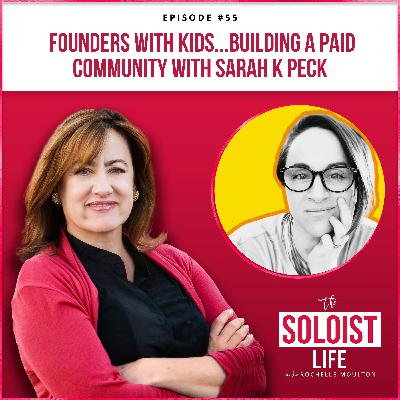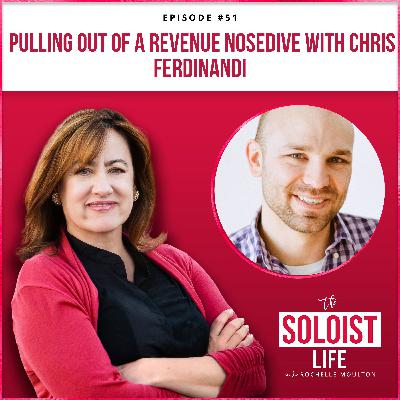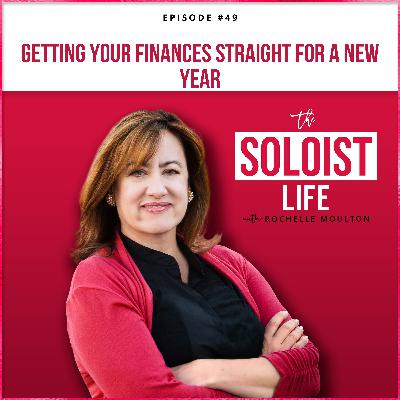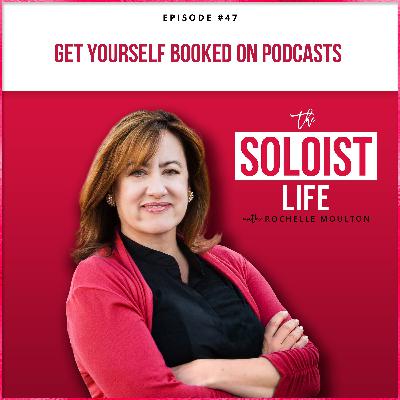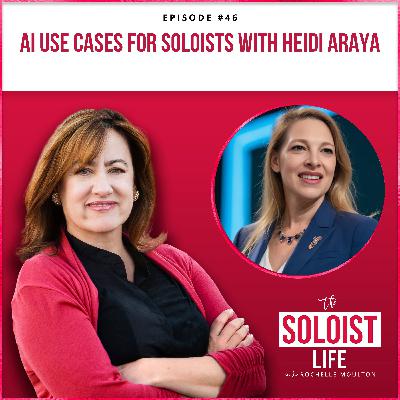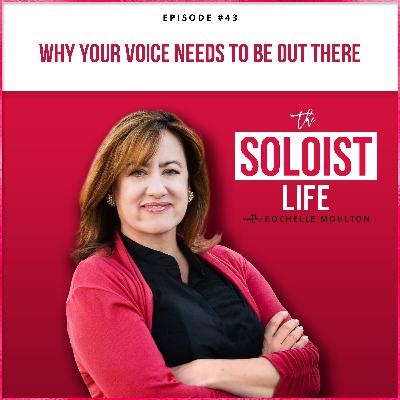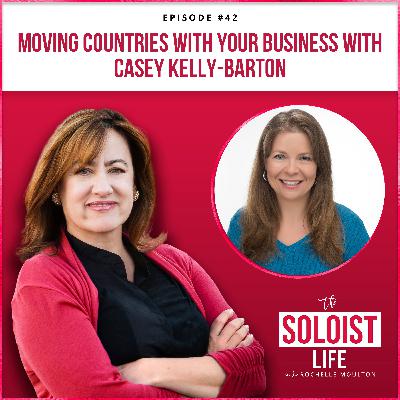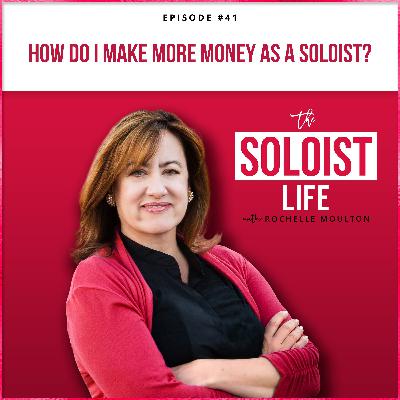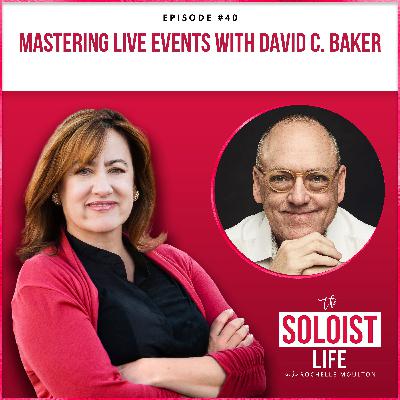How To Scale From $200K (Without A Single Hire)
Description
When you’re building a Soloist expertise business, it’s pretty common to plateau around $200K or so in revenue.
Typically at that point, you’ve found your groove and can reliably hit that number—but if you want to scale beyond that, conventional wisdom screams that it’s time to hire employees.
Uh, no.
You’ve got plenty of faster, easier and safer choices when you want to scale:
Why hiring employees can be a viable model (I built and sold a boutique firm to the big boys for seven figures), but is front-loaded with challenges and risks.
The role niching can play in busting through a revenue plateau—by weaving yourself into an existing cohort of clients and buyers.
How to think about productizing your services and its impact on your revenue, your pipeline and your lifestyle.
Moving from implementation or execution services to high price point advisory options.
The three criteria you need to meet to make raising your prices a slam dunk.
LINKS
Rochelle Moulton Email List | LinkedIn | Twitter | Instagram
RESOURCES FOR SOLOISTS
Join the Soloist email list: helping thousands of Soloist Consultants smash through their revenue plateau.
The Authority Code: How to Position, Monetize and Sell Your Expertise: equal parts bible, blueprint and bushido. How to think like, become—and remain—an authority.
TRANSCRIPT
Rochelle Moulton
You might have a business where you come in, you do a project, and you exit never to be seen again. But many of you do work that produces deep tentacles into client organizations, so you want any productized services you offer to support that. Hello, hello. Welcome to the Soloist Life Podcast, where we're all about turning your expertise into wealth, impact, and power. I'm Rochelle Moulton, and frankly, I'm still deciding how it feels to add power at the end of this intro, probably because I've never really been about power per se, but about my personal definition of wealth, enough money, free time, independence, flexibility and impact to enjoy my life and my work.
Rochelle Moulton
But as I said in my last solo episode, as soloists, we definitely have economic and leadership power, and it's time we use them. So I'm keeping that thought, power, and channeling it in this space for now. Speaking of power, today I want to talk to you about how to scale after you hit $200,000 or so in revenue. And the reason I want to hit on this today is I just tripped over a podcast episode about this topic, and I couldn't disagree more with the host's conclusions. See if you can't guess why. The main piece of advice was, wait for it, it's time to hire someone who does what you do, a mini-me.
Rochelle Moulton
Now, look, if your goal is to grow a business with employees, this is actually not bad advice. Somewhere around $200,000 is often when solos selling expertise bump up against what feels like a revenue ceiling. So you hire a mini you, and theoretically, you can then double your revenue. Woo-hoo, right? Well, no, the devil lies in the details. You have to source, hire, train, and supervise this person. You have to pay them a salary, maybe even bonus them. You have legal obligations to them and anyone they touch as your employee. And there's no guarantee you'll be able to bring in enough revenue to actually make a profit on your hire.
Rochelle Moulton
Hey, I built a very successful boutique consulting firm with employees. It can absolutely be done, but not without a real desire to nurture and lead your people. No matter what happens, you owe them the best version of you, as well as transparency about how they are or are not contributing to your firm's body of work and reputation. It's a lot. And besides, I'm betting if you're listening to this podcast, you're looking for ways to scale without dipping your toe into the employee pool. Am I right? Yeah, thought so. So let's talk about some other ways you can scale.
Rochelle Moulton
And I see at least four of them. One, you can niche down into a highly lucrative segment of your client base. That allows you to experiment with creating multiple high value offers that are scalable. Two, you can build productized services where you're still present for some, maybe even all of the work, but you've streamlined it and priced it well upstream. Three. you can add high price point advisory options. Now, this can be very attractive when you've been focusing on execution or implementation work, because at some point, you'll be experienced enough and savvy enough to develop advisory options that put a value on your availability and applied wisdom, rather than on the hours you actually work.
Rochelle Moulton
And finally, four, the easiest of all, when you're providing exceptional value to a specific audience, you can raise your prices. Now, I totally get that your mindset plays an outsized role in deciding to raise prices, but we're gonna talk about that, okay? All right, let's dive in. First, scaling by niching. This always feels counterintuitive. You're niching down, making your potential audience smaller to increase your revenue. But it can work beautifully if you choose the right niche, your people, and your specialty, and package your services effectively. If you think about some of the stories told by guests on this show, there's some huge advantages to niching down to a specific target market.
Rochelle Moulton
Geraldine Carter, in episode one, is on a mission to help single owner CPAs get down to 40 hours. Literally everything she does is in service to that audience and her revenue keeps multiplying the more she focuses on helping them get out of chaos. Emily O'Meara in episode 14 is all about open source startups and their unique challenges. And just in the last episode, Sarah Kay Peck shared her 10 plus year journey on her mission to help parents in startups. You'll want to feel strongly about your people so that you're willing to cross that inevitable dip that will make it hard slogging for a while as you experiment to find what gets you the best traction.
Rochelle Moulton
Ideally, you think of their getting the results they most want a bit like the Holy Grail. You're 100% invested in their success. Okay, number two, productize services. Productized service is a high value service you deliver in a tried and true way every time. Most of us have some sort of services that lend themselves to productization, like assessments, strategy sessions, strategy delivery, et cetera. And one of my favorites is Pia Silva's story on how she created her brand up. It's in episode 13, if you want to give it a listen. In a nutshell, she figured out that she made more money on her $3,000 one-day brand sessions than the $30,000 projects she was having trouble closing.
Rochelle Moulton
Eventually, she doubled down on doing only those and gradually raising the price so that when she last did them, she was hitting $30,000 per project. But while it started out as a financial move, she quickly realized that it allowed her to live a much more flexible life than always being on call for clients. A couple of projects a month were enough to live the personal and professional life she was wanting. If you're doing big-scale implementation work, like, say, change consulting to large corporates or brand strategy, where your fees feel like an eye-popping risk to your clients, an entry-level productized service can be just the ticket.
Rochelle Moulton
First, they get a taste of working with you without all of the financial risk. Say that your full-bore brand strategy work runs $300,000, while your front-end strategy is $30,000. Either party realizes this isn't going to work, you've got an easy out. And on the flip side, once you've had a solid working relationship, it's far, far easier for them to say yes to the other $270,000. Second, since it's a shorter term, lower dollar project, it's a lot easier to get that initial yes. Your time from proposal to close will feel lightning fast and you'll save a whole bunch of time and stress not circling around on big proposal check-ins.
Rochelle Moulton
Third, your productized service doesn't have to lead to those big engagements. In fact, you might use it to smooth out your revenue between mega projects, or even to keep future clients warm until they're ready for the full scope of your work. To decide if and how productized services might work for you, don't just look at revenue flow, but the lifetime journey of your clients with you. You might have a business where you come in, you do a project, and you exit never to




